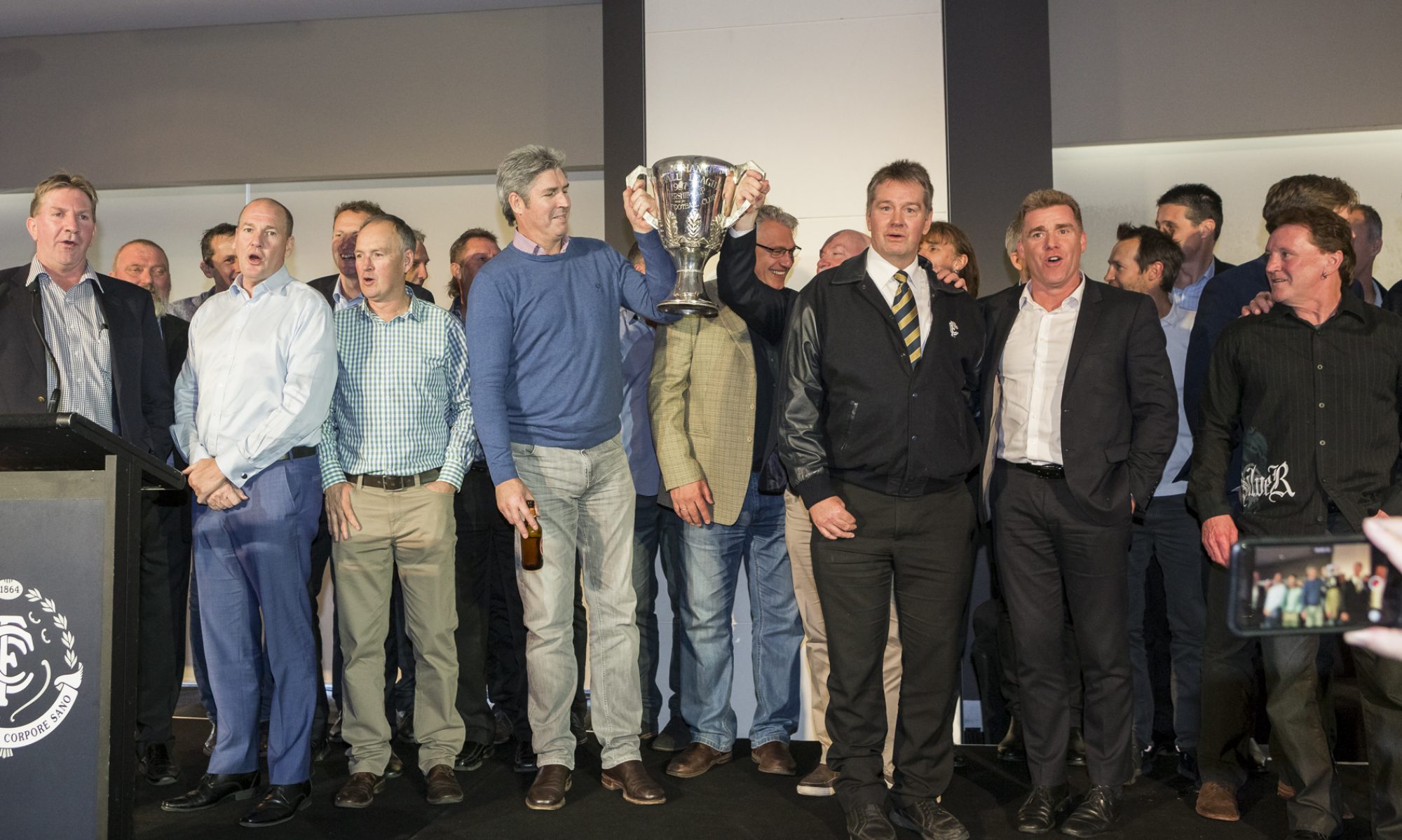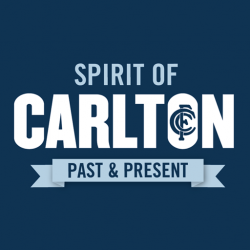Carlton’s 1995 premiership backman Michael Sexton’s address following the the Spirit Of Carlton Past and Present’s golf day
Feb 4, 2009, 10:30am

Carlton’s 1995 premiership backman Michael Sexton has reminded today’s footballers of their finite time in the game, in an address delivered following the Spirit Of Carlton Past and Present’s golf day at the Keysborough club.
Sexton, a 200-game player and dual All-Australian who negated Geelong’s Bill Brownless in what was his club’s last Grand Final victory, impressed upon the players the need to make the most of their opportunities, whilst at the same time being mindful that there is life after football.
Sexton’s captive audience included club President Stephen Kernahan, coach Brett Ratten, captain Chris Judd, Brendan Fevola and Matt Kreuzer. A host of former Carlton footballers were also in attendance, including premiership players Mark Maclure, Rod Ashman, Trevor Keogh, Syd Jackson, Tom Alvin, Val Perovic, David Rhys-Jones, Jim Buckley, Adrian Gleeson, Geoff Southby and Mark Naley, who jetted in from Adelaide, together with premiership coaches Robert Walls and David Parkin.
Here is an edited version of Sexton’s address
“Carlton has meant an enormous amount to me in my life, and to get the opportunity to come along here to speak is great.
I think it’s incredibly important for a club like Carlton, particularly now that we’ve got such a young list, for young players to mix with older players and people who have been where they are now. When I started at Carlton I was 17 when I got drafted. That was 20 years ago this year, which is incredible when you look back on it. I can’t believe how time goes and what’s happened in that time.
I grew up like every kid, watching footy on the telly all the time, but when I got down there, to meet all the players for the first time, was very, very different. ‘Sticks’ was captain then, but he wasn’t around at training at that particular time. And I remember that there was a tall guy with dark black hair and big mudflaps there by the name of Gerard Butts, and I was calling him Sticks a few times before I realised I didn’t have the right bloke! I was just an innocent kid from the country . . .
It was a great time to get to Carlton. It was on the end of a very successful time for the club in the 80s, and there were a lot of players there in their late 20s and early 30s who I’d watched on telly as a kid growing up. Even though some of them were nearing the end of their careers, it was a great way to be indoctrinated into the culture of the club.
Lists were bigger, there were more than 50 people at Carlton when I got there, and in the first year I got there, 1989, I was mainly playing under 19s and reserves. When I played in the reserves there were times where I was on of two or three players in the team who hadn’t played senior football, and a lot of the guys who were playing had played in finals football and premierships. To get a chance starting out with those players was an enormous experience, and I know I picked up an enormous amount from them.
There’s probably a lot of things that the younger guys can teach the older guys as well. I was talking to a guy who came to my office last week who’s involved in the mentorship program that ‘Ashy’ [Rod Ashman] has recently started, which is a fantastic idea. He was saying that the week before he had met the player he was mentoring this year and couldn’t believe how well this guy had his life in order, and of how incredibly focused and committed he was. This former player was saying that if anything, the young guy would be mentoring him!
This mentorship program is something that can work both ways, and its introduction is a credit to the club. It seems now that everyone is heading in the right direction, the right people are about the place, and it’s a pleasure to be involved in any way possible. I’m looking forward to my role in that mentorship program this year as well.
When I first came down to Carlton I’d just got accepted into a university position to study chiropractic. I had to cope with a five-year degree, and it was pretty full-on at the time trying to combine my study and all the clinic hours that went with it, with football training. Training was pretty heavy then, probably not as spread out across the day as it is now, but it was still quite difficult fitting it in. Fortunately, when things started getting a little bit more serious with my football and I was getting up into the senior team, I was lucky enough that the university lecturer was appointed coach. ‘Parko’ [David Parkin] was very keen on people looking after themselves outside of football, particularly in regards to education, and I ended up missing a hell of a lot of training in those first five years I was at Carlton. By the way I missed a lot of lectures as well, but fortunately that wasn’t to the great detriment of my football career and I was able to combine the two to some degree.
I sometimes look back on those days as very hard, where I didn’t have proper days at training and I had to go back and study. It did get very difficult at times, but it’s something I look back on as a huge advantage in my life for many reasons. If you’ve got responsibilities and commitments away from football, it does help you get away from it a little bit, so that when you are at the club you can be a little bit more relaxed and a little bit more focused, particularly early on.
Football can be a bit of a roller coaster – one minute you’re flying and the next week you’re rotten. It’s up and down, up and down, and sometimes if you put all your eggs in one basket as a footballer your sense of self-worth becomes a bit too rapt up in your football, which is a recipe for getting a bit of grief.
Judging by the way you train now, I don’t think you can go and do full-on university courses. Then again, education’s changed as well, and you can participate in lectures on podcasts these days, so it’s just a matter of finding what fits in with your lifestyle and trying to make sure that you do have some sense of balance.
I had a lot going on when I was playing at Carlton in my 20s. I’ve got four kids, a business and I had plenty to keep myself busy, and when I finished playing football it was a hell of a shift in lifestyle and it took a hell of a lot of getting used to.
I don’t really understand how people can go from football to nothing, so I encourage you to really think about that. If you’ve got other commitments outside of playing it’s a huge advantage. It’s a bit of a buffer, and one of the main pieces of advice I’d have for young players coming into, is to make sure you’re committed to what you’re doing, but you’ve also got one eye on the future and that you understand that there is life outside of football.
There’s a whole heap of ways in which you can live a good life, football is one of them, and all of the players who ever played at Carlton grew up dreaming they would one day play League football. If you’ve got that opportunity now, I’d suggest that you give it everything that you can to make that dream come true, and leave no stone unturned to get the most out of your career, because it can be a charmed existence and you want to make sure that you really do enjoy it and appreciate it while it’s here. Otherwise, one day you’ll be sitting there realising that you haven’t played for the past ten years or twenty years, and that it’s all over.”

